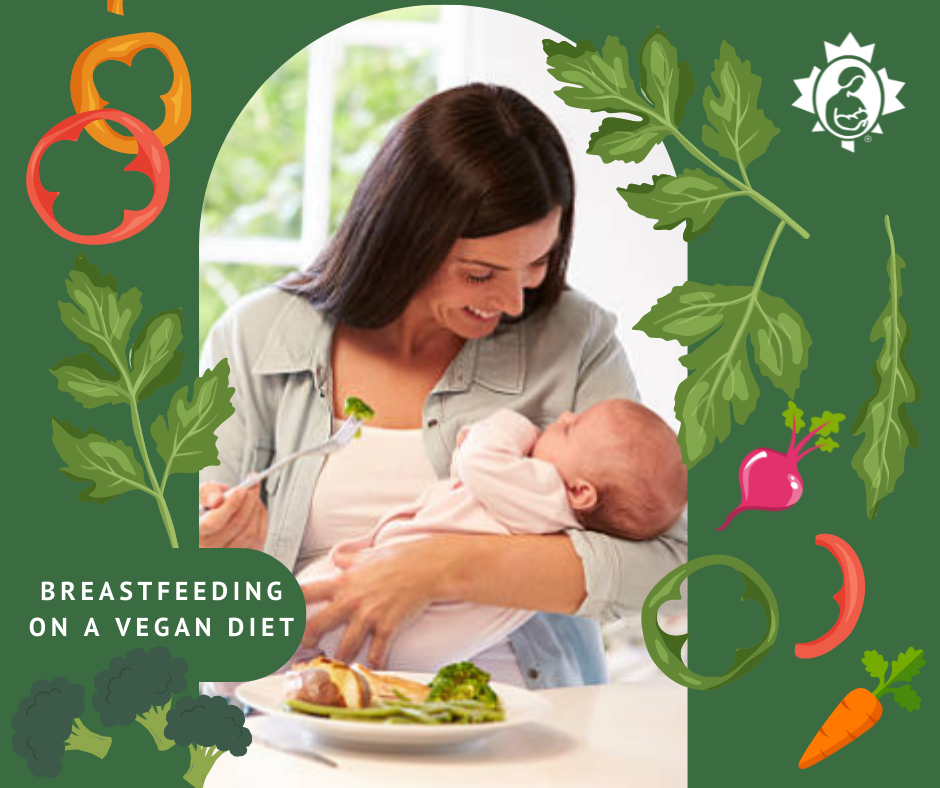
You may wonder if a vegan diet is sufficient to support your nutritional needs and those of your baby when breastfeeding. The short answer is: absolutely! Many vegan mothers have successfully breastfed and raised healthy babies.
When you are vegan, though, there are some areas that might need special attention. The first is ensuring that you get enough extra calories – about 500 per day for an exclusively-breastfed baby – to enable you to make the milk your baby needs. (One peanut butter and jelly sandwich or the equivalent will give you those extra calories.) The second is addressing some of the particular nutrients that can be harder to get for vegans: calcium, vitamin B12, vitamin D, protein and iron.
Calcium
While nursing, your body needs at least 1000 mg of calcium per day. Calcium is available from dark leafy green vegetables, beans and tofu (there is calcium in regular tofu and even more in calcium-set tofu). You can also find foods with calcium added such as enriched orange juice, soymilk, and enriched soy products. If needed, calcium supplements are available and most are vegan.
Vitamin B12
Vitamin B12 is primarily available from animal products, so most vegans take a supplement of this vitamin. If you are already taking B12, and your levels are good, your milk will be an excellent source for your baby. If not, the low levels of B12 can cause serious health problems for your baby.
You can ensure that they have adequate amounts of vitamin B12 by taking a daily B12 supplement and eating vegan foods that are high in B12. These include fermented soybean products, fortified nutritional yeast flakes, seaweed products and other foods fortified with vitamin B12. Consult your health professional or a dietician to determine whether or not your diet contains enough vitamin B12.
Vitamin D
Sunlight is the best source of vitamin D. When your skin is exposed to the sun, you make vitamin D from cholesterol in your body. People with lighter skin colours need less sunlight to make vitamin D and people with darker skin colours need more sunlight to make the same amount. Due to the angle of the sun during the winter in Canada, our bodies are not able to produce sufficient amounts of vitamin D from sunlight. In addition, the sun can damage babies’ sensitive skin. Because of this, Canadian health professionals recommend that babies be given 400 IU of vitamin D daily. This is usually given in the form of drops into the baby’s mouth, but the brands usually recommended are not vegan. Vegan vitamin D drops for babies are commercially available online and at some health food stores. It is possible to increase the amount of vitamin D in your milk with safe exposure to the sun and by taking very high doses of vitamin D supplements (there are supplements for adults that are vegan). If you are not comfortable giving your baby non-vegan supplements, you can discuss the options with a health professional. Being deficient in Vitamin D can cause serious health problems for babies.
Protein
The recommended intake of protein for nursing parents is 65 grams (2 oz) per day for the first six months, and 62 grams per day between six and twelve months. And yes, the most common question vegans get asked is “Where do you get your protein?” You probably already know: A varied vegan diet that includes a range of protein sources such as soy products, legumes and grains should provide plenty of protein for you and your baby.
Iron
The iron found in human milk is usually sufficient for infants throughout the first four to six months, unless you have been anemic during your pregnancy. Dried beans and dark green leafy vegetables are especially good sources of iron. Iron absorption is improved by eating foods containing vitamin C along with foods containing iron. If you are concerned about your iron levels you can consult with your health professional or a dietician. If you have any questions about what to eat while breastfeeding, or any other breastfeeding topic, please contact a La Leche League Leader.
If you have any questions about what to eat while breastfeeding, or any other breastfeeding topic, please contact a La Leche League Leader.
Please consider supporting LLLC.
References:
Mohrbacher, Nancy. (2020). Breastfeeding Answers: A Guide for Helping Families, Second Edition. Nancy Mohrbacher Solutions, Inc.
La Leche League International. Vitamins and Other Nutritional Supplements. www.llli.org/breastfeeding-info/vitamins-nutritional-supplements/
WebMD. (2021, December 14). Vitamin B12: What to Know. www.webmd.com/diet/vitamin-b12-deficiency-symptoms-causes
Updated 2024
